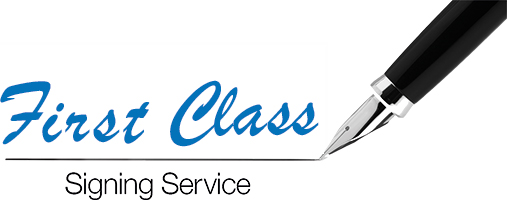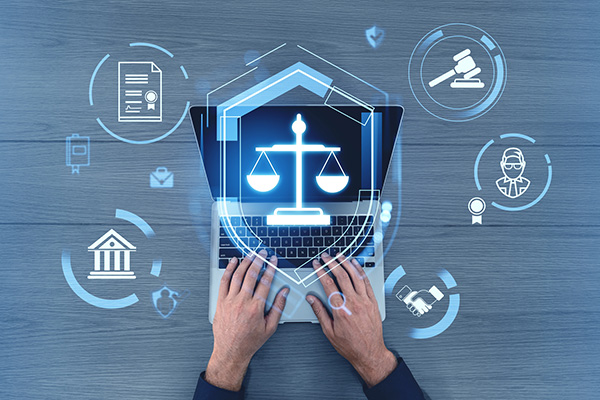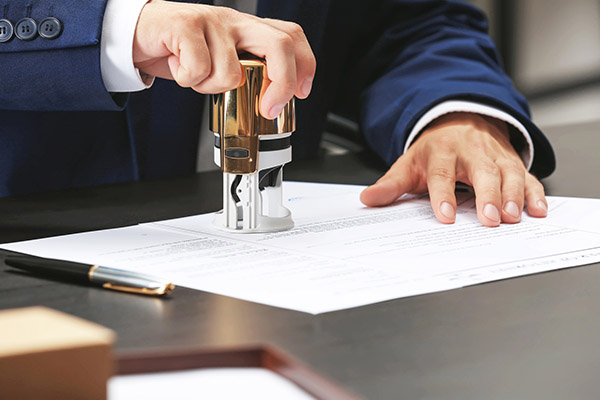Remote online notarization (RON) is every bit as valid, accurate, safe and secure as traditional, face-to-face notarization. If you’ve ever wondered how RON can remain fully secure in a digital world that is prone to cyberattack and fraud, read on for the answers.
How Online Notaries Verify Your Identity
Many people have trouble understanding how an online notary can adequately verify the identities of document signers without meeting them in the same room. However, online notaries take the same precautions as the traditional notary (ID card inspection and inquisitive interviewing) to ensure that all signing parties are exactly who they say they are.
RON platforms come with knowledge-based authentication (KBA) gateways, biometric facial recognition, automated credential analysis and other state-of-the-art digital identity verification to help detect fraudulent IDs and exclude them from use.
In addition to enhancing the notary’s ability to analyze credentials and authenticate documents, RON can help protect notary integrity and workplace safety. Because RON uses two-way, audio and video communications that are both streamed live and recorded for posterity, remote online notaries are significantly less likely to face pressure from clients who want them to break relevant laws or deviate from best practices.
Your Security Is Our Priority: Our Advanced Fraud Prevention Measures
Beyond protecting against ID fraud at the beginning of the signing session, RON ensures the safety and security of notarized documents in perpetuity through the application of electronic signatures (e-signatures) and an electronic seal (e-seal) at the end of the signing session. Once imprinted digitally on a document, e-signatures and e-seals are permanent and tamper-proof, preventing malicious players from fraudulently altering that document in the future.
In fact, digital fraud prevention measures have made RON transactions and documents safe and valid for roughly two decades. Notarized documents are sent to a government-approved technology platform on a secure server. Documents are stored along with audiovisual recording of signing sessions and notarization journal records that leave a time-stamped audit trail for full transparency.
Detecting and Stopping Coercion
The audiovisual streaming and recording of each RON session allows notaries to check the identities of all document signers and leave a lasting record of the event to deter tampering. But video conferencing/recording is also an important tool when it comes to monitoring document signers for signs of duress.
Identifying coercion-caused duress is an important challenge for all notaries. While it is easy to imagine a signer facing an off-screen threat during a RON session, standard RON operating procedures include comprehensive measures to ensure that this scenario cannot occur.
Frankly, subtle forms of coercion can be difficult to detect, both for remote online and traditional notaries. However, notaries have proven an effective force in the fight against coercion. Trained to recognize cases of psychological or emotional manipulation, notaries look for red flags such as extreme urgency/pressure to sign and time limitations on document review.
All the details associated with a RON document/transaction are included in a dated and time-stamped record called an audit trail. Because all signing parties have access to both the document and its audit trail, RON offers full transparency that traditional notarization does not.
Legal and Data Security Protections Nationwide
Recognizing both its efficiency and its security, state governments across America have been adopting RON legislation since 2011. Today, 47 of the 50 states support and regulate widespread RON operations. State governments support RON with unique sets of goals and legal standards. States also place strict regulations on the digital transmission and storage of RON documents.
These documents are typically protected by AES-256 and other forms of heavy-duty encryption to keep cyberattacks from illegally tampering with them or accessing the sensitive information that they contain. Accessible to all signing parties for reference with the proper passwords and credentials, RON documents are retained permanently on secure servers.
Addressing Cybersecurity Risks
While the risk of cyberattack will never go away entirely, RON systems have proven extremely effective at addressing potential threats and keeping notarized documents secure. If the remote online notary in charge of your signing session is well-trained and adheres to best industry practices, RON cybersecurity is generally airtight. Notaries can safeguard documents against manipulation and unauthorized access by using tools such as multi-factor authentication and encrypted meeting software.
Notaries can also protect against cyberattack by protecting their electronic notary seals from tampering and unauthorized use. After obtaining an official e-seal from a reputable provider, remote online notaries should take care to store them with strong encryption and strict access limitations on a secure, government-approved server.
Find the Right Online Notary Provider for You
When you think about it, Remote Online Notary uses the full power of today’s technology to make sure your signed and notarized documents are verified, protected and stored securely. Interestingly, it’s often proven to be even safer than traditional paper notarization.
As a client, you’ve got the power to prioritize security by picking the right RON provider. Need secure remote online notarization services? Reach out to the team at First Class Signing Service today.
Need a Signing Today?
First Class Signing Service’s home office is in Livermore, California, but we pride ourselves on delivering all-in signing solutions to clients nationwide, covering all 50 states and four U.S. territories.
What sets us apart is our exceptional team of 50,000-plus highly qualified signing agents who are dedicated to providing reliable and efficient signing services with utmost care and professionalism.





